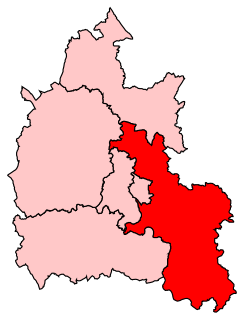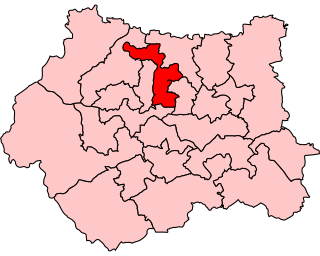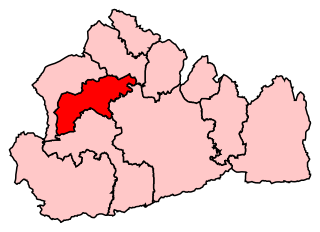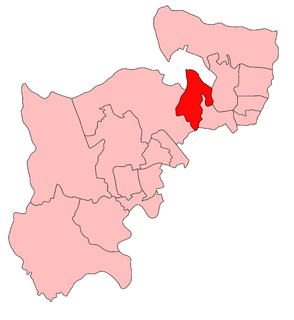
The 1950 United Kingdom general election was the first ever general election to be held after a full term of Labour government. The election was held on Thursday 23 February 1950. Despite polling over 700,000 votes more than the Conservatives, and receiving more votes than they had during the 1945 general election, Labour obtained a slim majority of just five seats—a stark contrast to 1945, when they had achieved a comfortable 146-seat majority. There was a national swing towards the Conservatives, whose performance in terms of popular vote was dramatically better than in 1945. Labour called another general election in 1951.

Mid Ulster is a parliamentary constituency in the British House of Commons.
The Northern Ireland Labour Party (NILP) was a political party in Northern Ireland which operated from 1924 until 1987.

East Dunbartonshire is a county constituency of the House of Commons of the Parliament of the United Kingdom (Westminster). It elects one Member of Parliament (MP) by the first past the post system of election. The current MP for East Dunbartonshire is Jo Swinson.

Henley is a constituency in Oxfordshire represented in the House of Commons of the UK Parliament since 2008 by John Howell, a member of the Conservative Party.

Brighton Kemptown is a constituency created in 1950 in the House of Commons of the UK Parliament covering the eastern portion of the city of Brighton and Hove including Kemptown and part of the Lewes District.

Pudsey is a constituency represented in the House of Commons of the UK Parliament since 2010 by Stuart Andrew, a Conservative.

Woking is a constituency created in 1950 represented in the House of Commons of the UK Parliament. To date it has elected at each election the Conservative Party candidate.

Finchley was a constituency represented in the House of Commons of the Parliament of the United Kingdom. It elected one Member of Parliament (MP) by the first past the post system of election; its best-known MP was Margaret Thatcher, Prime Minister from 1979 to 1990. Although boundary changes meant that she never again attained her large majority of 1959, she was nonetheless returned by comfortable (9,000) majorities at General Elections throughout her premiership.
Thomas James Mitchell is an Irish republican. He was active in the Irish Republican Army and took part in a raid on Omagh barracks in 1954, being captured and imprisoned. While in jail he was twice elected as a Member of the United Kingdom Parliament, but was disqualified and his elections overturned.
The by-election held in Mid Ulster on 11 August 1955 was called as a result of a vote in the British parliament on 18 July 1955 which voted 197 votes to 63 to nullify the result of the previous 1955 UK General Election in the constituency. At that election, Sinn Féin candidate Tom Mitchell took the seat.
Westminster Abbey was a constituency in the Parliament of the United Kingdom. It returned one Member of Parliament (MP) to the House of Commons by the first past the post system of election.
Henry Cassidy Midgley, PC (NI), known as Harry Midgley was a prominent politician in Northern Ireland. Born to a unionist family in Belfast, he worked in the textile industry before joining the Royal Engineers during World War I.

Bermondsey was a borough constituency centred on the Bermondsey district of South London, England. It returned one Member of Parliament (MP) to the House of Commons of the Parliament of the United Kingdom. Election were held using the first-past-the-post voting system.
The Belfast West by-election 1943, was a by-election held on 9 February 1943 for the British House of Commons constituency of Belfast West, in Northern Ireland. The seat had become vacant when the sitting Unionist Member of Parliament (MP) Alexander Browne had died in December 1942.
The Combined Scottish Universities by-election, 1938 was a by-election held from 21 February to 25 February 1938 for the Combined Scottish Universities, a university constituency of the British House of Commons.
The North Cornwall by-election, 1939 was a parliamentary by-election held on 13 July 1939 for the British House of Commons constituency of North Cornwall.
The 1955 United Kingdom general election in Northern Ireland was held on 26 May as part of the wider general election with 12 MPs elected in single-seat constituencies using first-past-the-post.










